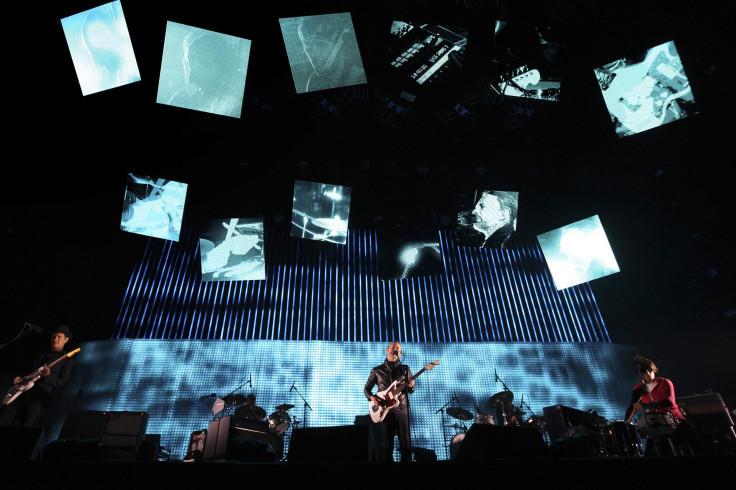Radiohead, The Doors, Lauryn Hill And Steve Martin Among 25 Recordings To Be Preserved By Library Of Congress [PLAYLIST]

The Library of Congress' National Recording Registry has announced its 2014 list of recordings that will be preserved for future generations. Radiohead's "OK Computer," Joan Baez's debut album, Steve Martin's "A Wild and Crazy Guy," the Doors' self-titled debut and "Stand!" by Sly and the Family Stone are among the 25 recordings deemed "culturally, historically or aesthetically significant."
The 25 recordings, spanning more than 100 years, were selected from public nominations made during 2014. They range from perhaps the earliest recording of "Oh My Darling, Clementine" to Arthur Godfrey's radio broadcast of President Franklin D. Roosevelt's funeral to Radiohead's "OK Computer." There are no exact criteria for what gets added to the registry annually, but the Librarian of Congress, James Billington, gets some help from the Library’s National Recording Preservation Board. The public can nominate sounds and recordings via the NRPB website.
"Congress understood the importance of protecting America’s aural patrimony when it passed the National Recording Preservation Act 15 years ago," Billington said in a statement. "By preserving these recordings, we safeguard the words, sounds and music that embody who we are as a people and a nation." Some of the recordings -- such as "Stand by Me" by Ben E. King, "You've Lost That Lovin' Feelin' " by the Righteous Brothers and "Stand!" by Sly and the Family Stone -- were chosen for their popularity and significance in defining a particular sound. Other recordings, such as the Vernacular Wax Cylinder Recordings collection at the University of California, Santa Barbara and the Benjamin Ives Gilman Collection of recordings from the 1893 World's Columbian Exposition at Chicago, were chosen for their historical significance and importance for preservation.
The list is meant to be fun and educational, Steve Leggett, National Recording Registry coordinator, told International Business Times. "It's really about trying to come up with an eclectic list each year from all the different recordings and sounds that have been done over the past 150 years or so. A person could really do a crash course in music and sound by looking at the list each year," Leggett said.
Of this year's list, Leggett enjoys the popular selections and highlights UCSB's wax recording collection. "You've heard of home movies -- these are like home recordings people made in California in the 1890s to the early 1900s. These are events of their daily lives," Leggett said. "We think that these amateur recordings often give a good impression of what life was like. You really get the flavor of what life was like back then."
The Library of Congress has the unenviable task of sorting through thousands of recordings that could be included on the list, so it's not surprising a few selections just miss the list each year. Leggett said Radiohead and Baez have been discussed over the years prior to getting added in 2014.
"For the album, the band had mostly stripped away such alt-rock signposts as personalized lyrics, sinus-clearing guitars and thunderous bass and drums," the Library of Congress said of "OK Computer" by Radiohead. "The ghosts of the Pixies and Nirvana have been decisively exorcised. The presence of fin de siècle electronic dance music, jazz, 20th-century classical and dub are all palpable. While these bold moves risked alienating the band’s sizable audience, they paid off with more than a decade of critical praise including two scholarly philosophical works on the band."
You can listen to a playlist of the National Recording Registry's selection below.
2014 National Recording Registry
- Vernacular Wax Cylinder Recordings at University of California, Santa Barbara Library (c.1890-1910)
- The Benjamin Ives Gilman Collection, recorded at the 1893 World’s Columbian Exposition at Chicago (1893)
- "The Boys of the Lough"/"The Humours of Ennistymon" (single) — Michael Coleman (1922)
- "Black Snake Moan"/ "Match Box Blues" (single) — Blind Lemon Jefferson (1928)
- "Sorry, Wrong Number" (episode of "Suspense" radio series, May 25, 1943)
- "Ac-Cent-Tchu-Ate the Positive" (single) — Johnny Mercer (1944)
- Radio Coverage of President Franklin D. Roosevelt’s Funeral — Arthur Godfrey, et al. (April 14, 1945)
- "Kiss Me, Kate" (original cast album) (1949)
- "John Brown’s Body" (album) — Tyrone Power, Judith Anderson and Raymond Massey; directed by Charles Laughton (1953)
- "My Funny Valentine" (single) — The Gerry Mulligan Quartet featuring Chet Baker (1953)
- "Sixteen Tons" (single) — Tennessee Ernie Ford (1955)
- "Mary Don’t You Weep" (single) —The Swan Silvertones (1959)
- "Joan Baez" (album) — Joan Baez (1960)
- "Stand by Me" (single) — Ben E. King (1961)
- "New Orleans’ Sweet Emma Barrett and Her Preservation Hall Jazz Band" (album) — Sweet Emma and Her Preservation Hall Jazz Band (1964)
- "You’ve Lost That Lovin’ Feelin’ " (single) — The Righteous Brothers (1964)
- "The Doors" (album) — The Doors (1967)
- "Stand!" (album) — Sly and the Family Stone (1969)
- "Lincoln Mayorga and Distinguished Colleagues" (album) — Lincoln Mayorga (1968)
- "A Wild and Crazy Guy" (album) — Steve Martin (1978)
- "Sesame Street: All-Time Platinum Favorites" (album) — Various (1995)
- "OK Computer" (album) — Radiohead (1997)
- "Songs of the Old Regular Baptists" — Various (1997)
- "The Miseducation of Lauryn Hill" (album) — Lauryn Hill (1998)
- "Fanfares for the Uncommon Woman" (album) — Colorado Symphony Orchestra, Marin Alsop, conductor; Joan Tower, composer (1999)
© Copyright IBTimes 2024. All rights reserved.











